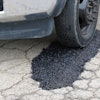VALLEY FORGE, PA - A task force with the American Association of State Highway Transportation Officials (AASHTO) has recommended that heavy metals in glass beads for highway markings must meet a maximum allowable limit of 200 ppm for arsenic, 200 ppm for lead, and 200 ppm for antimony. The task force, which has studied heavy metals in glass beads used on highway markings for the past four years, made the recommendation to the association's materials committee, which voted unanimously to recommend that all member states adopt limits at least as stringent as these.
"We at the American Glass Bead Manufacturers' Association (AGBMA) are encouraged by AASHTO's recognition of the significance of this problem and find it appropriate AASHTO is recommending its member states set limits on arsenic, lead, and antimony," said Bob McClune, president AGBMA. "Compliance by member states with these AASHTO recommendations will protect the environment, state highway workers, and the public at large." Twenty-four states already have set limits consistent with this recommendation, and there is hope that the remaining states will now rapidly implement minimum protective limits, McClune added. "We commend AASHTO for addressing this important issue," he said.
A three-year study sponsored by the New Jersey Department of Transportation reaffirmed prior research work which has shown that imported glass beads can have high levels of arsenic and lead and were quickly susceptible to leaching with exposure to ground water and normal environmental conditions, the association said. The findings from this exhaustive study solidify all the previous research and are consistent with a recent Texas A&M University Texas Transportation Institute (TTI) study. They also confirm what the membership has known to be true for quite some time, according to McClune.
Over the past several years, the association has worked diligently to raise awareness of the issue, citing the need to hold all manufacturers to higher quality standards that protect the environment and highway worker safety by avoiding the use of products that contain hazardous materials. Setting a heavy metals standard for glass beads has gained strong support from environmental groups like the Sierra Club, state and federal lawmakers, and unions like the International Union of Operating Engineers.
The focus on avoiding the utilization of glass beads containing hazardous materials is intensifying globally with the European Union, Australia, New Zealand, and several Canadian provinces already setting similar standards. China, a major source of these questionable glass beads, has also set strict heavy metal standards for internal use but continues to export contaminated glass bead products to other nations, including the U.S., according to the association.




















